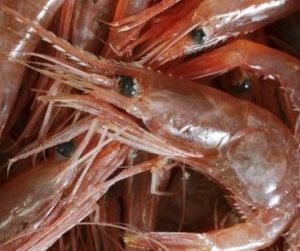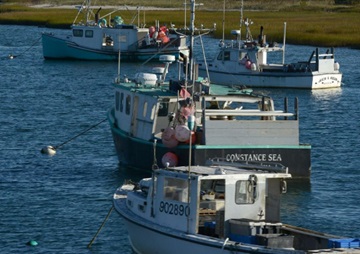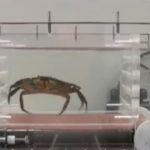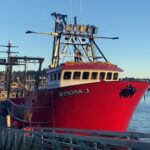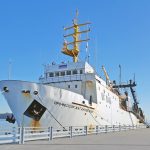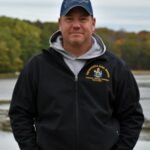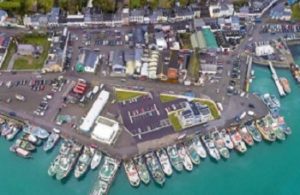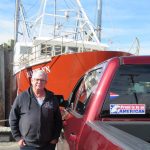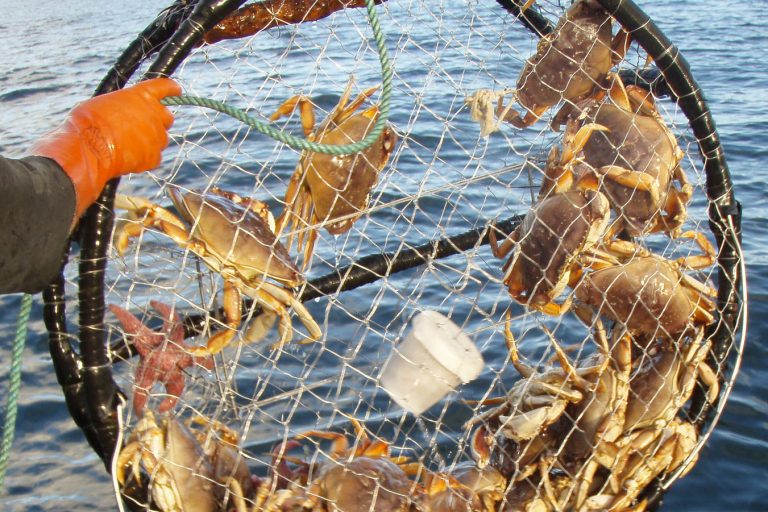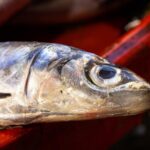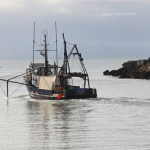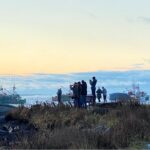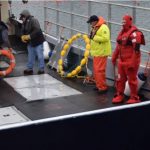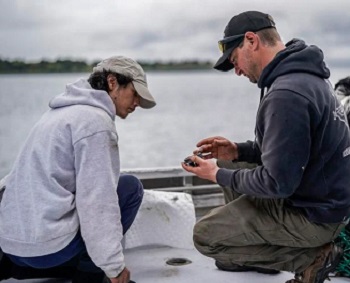 Lane Bolich first came to work in Alaska for the freedom and excitement that comes with being a fisher. A self-described adrenaline junkie, Bolich moved from his hometown in rural Washington state because he loves being on the ocean even in cold winter weather and it gave him the chance to make more money than back home. After working as a deckhand for two years on a family friend’s boat, Harmony, he took the wheel as captain this year at just 20 years old. Bolich is a rarity in an aging industry with high barriers to entry, equipment and access rights are costly, and increasing unpredictability as human-caused climate change alters marine habitats. As some fish populations dwindle and fewer people pursue the trade, fishers and conservation groups are actively working to bring in and retain the next generation of fishers through grants and training even as the industry continues to shrink in Alaska. 19 photos, >>click to read<< 09:38
Lane Bolich first came to work in Alaska for the freedom and excitement that comes with being a fisher. A self-described adrenaline junkie, Bolich moved from his hometown in rural Washington state because he loves being on the ocean even in cold winter weather and it gave him the chance to make more money than back home. After working as a deckhand for two years on a family friend’s boat, Harmony, he took the wheel as captain this year at just 20 years old. Bolich is a rarity in an aging industry with high barriers to entry, equipment and access rights are costly, and increasing unpredictability as human-caused climate change alters marine habitats. As some fish populations dwindle and fewer people pursue the trade, fishers and conservation groups are actively working to bring in and retain the next generation of fishers through grants and training even as the industry continues to shrink in Alaska. 19 photos, >>click to read<< 09:38
Tag Archives: climate change
Climate change makes winners and losers out of cod and snow crab, says scientist
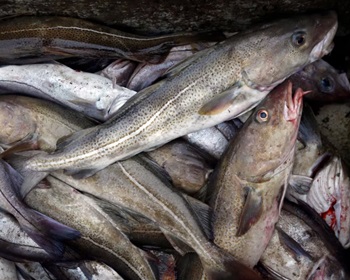 A team of scientists used modelling to look into the effects of climate change on three Grand Banks fish species. They anticipate that warmer waters could lead to biomass declines for snow crab and yellowtail flounder but gains for Atlantic cod. “That’s one thing that we see when we’re looking at the impacts of climate change on marine ecosystems and oceans, is that there are winners and losers. So it’s not as though everything is going to be negatively impacted,” said Tyler Eddy, a scientist with Marine Institute’s Centre for Fisheries Ecosystems Research. Species that thrive or struggle in these scenarios will depend on their thermal preferences and changes in a region, he said, adding a specific species might also leave a region to follow their preferred temperature. more, >>CLICK TO READ<< 10:06
A team of scientists used modelling to look into the effects of climate change on three Grand Banks fish species. They anticipate that warmer waters could lead to biomass declines for snow crab and yellowtail flounder but gains for Atlantic cod. “That’s one thing that we see when we’re looking at the impacts of climate change on marine ecosystems and oceans, is that there are winners and losers. So it’s not as though everything is going to be negatively impacted,” said Tyler Eddy, a scientist with Marine Institute’s Centre for Fisheries Ecosystems Research. Species that thrive or struggle in these scenarios will depend on their thermal preferences and changes in a region, he said, adding a specific species might also leave a region to follow their preferred temperature. more, >>CLICK TO READ<< 10:06
New England labor unions call for faster offshore wind buildout
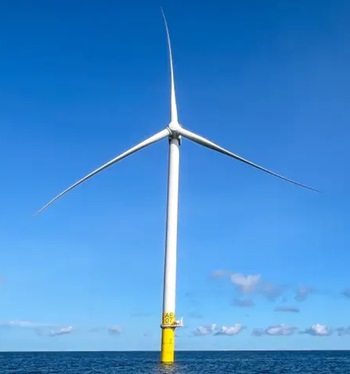 “We looked at the way this industry was starting to develop and thought to ourselves: How can we work as a labor movement to make sure we’re making this an industry that is not only going to benefit the climate but benefit our members?” (read the report) said Patrick Crowley, president of the Rhode Island chapter of the American Federation of Labor and Congress of Industrial Organizations (AFL-CIO), which represents roughly 900,000 union members across the three states. Crowley and the AFL-CIO partnered with the Climate Jobs National Resource Center and unions in Massachusetts and Connecticut to put together the new report, which outlines how the industry can expand with organized labor at the forefront. To begin with, the union report suggests that the states aim higher for their offshore wind goals in order to boost the region’s economy and take full advantage of their unique access to wind. more, >>CLICK TO READ<< 09:25
“We looked at the way this industry was starting to develop and thought to ourselves: How can we work as a labor movement to make sure we’re making this an industry that is not only going to benefit the climate but benefit our members?” (read the report) said Patrick Crowley, president of the Rhode Island chapter of the American Federation of Labor and Congress of Industrial Organizations (AFL-CIO), which represents roughly 900,000 union members across the three states. Crowley and the AFL-CIO partnered with the Climate Jobs National Resource Center and unions in Massachusetts and Connecticut to put together the new report, which outlines how the industry can expand with organized labor at the forefront. To begin with, the union report suggests that the states aim higher for their offshore wind goals in order to boost the region’s economy and take full advantage of their unique access to wind. more, >>CLICK TO READ<< 09:25
Port of Galilee and Marine Facilities to Undergo Major Upgrades with $15M FEMA Grant
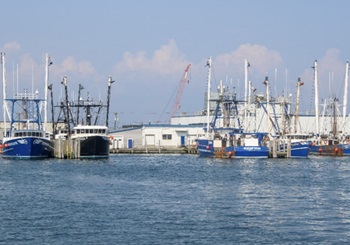 In a landmark step toward mitigating the impacts of climate change, Rhode Island has secured a $15.5 million grant from the Federal Emergency Management Agency (FEMA), the largest award of its kind in the state’s history. The funds will support a $17.2 million initiative to elevate critical infrastructure at the Port of Galilee in Narragansett and Wickford Dock, along with the replacement of eight docks across three state-managed marine facilities. The grant, matched with state funding, was announced by the Rhode Island Department of Environmental Management (DEM), the Rhode Island Emergency Management Agency (RIEMA), and the state’s Congressional Delegation. It aims to bolster resilience against rising sea levels, coastal flooding, and extreme weather events. The Port of Galilee, a vital economic engine for Rhode Island and the 13th highest value fishing port in the nation, is at the heart of the initiative. more, >>CLICK TO READ<< 14:39
In a landmark step toward mitigating the impacts of climate change, Rhode Island has secured a $15.5 million grant from the Federal Emergency Management Agency (FEMA), the largest award of its kind in the state’s history. The funds will support a $17.2 million initiative to elevate critical infrastructure at the Port of Galilee in Narragansett and Wickford Dock, along with the replacement of eight docks across three state-managed marine facilities. The grant, matched with state funding, was announced by the Rhode Island Department of Environmental Management (DEM), the Rhode Island Emergency Management Agency (RIEMA), and the state’s Congressional Delegation. It aims to bolster resilience against rising sea levels, coastal flooding, and extreme weather events. The Port of Galilee, a vital economic engine for Rhode Island and the 13th highest value fishing port in the nation, is at the heart of the initiative. more, >>CLICK TO READ<< 14:39
Right whale population grows 4%, but extinction remains a threat
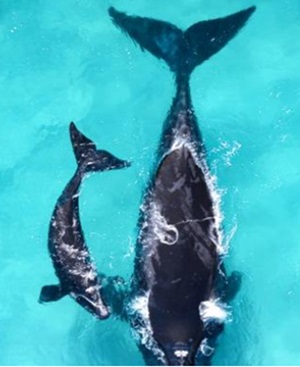 Conservationists are calling on the government, shipping and fishing industries to save the North Atlantic right whale from extinction despite an increase in its population. Researchers studying the whales said this week that the population increased to an estimated 372 in 2023. That’s an increase of about four percent from 2020, and “heartening news” after the whale’s population fell by about 25 percent from 2010 to 2020. The population of the right whale, which can weigh up to 150,000 pounds (68,039 kilograms) and lives off the East Coast, plummeted in the 2010s. Stressed by global warming and vulnerable to ship collisions and entanglement in fishing gear, their numbers fell to fewer than 360 by the early 2020s. more, >>CLICK TO READ<< 12:29
Conservationists are calling on the government, shipping and fishing industries to save the North Atlantic right whale from extinction despite an increase in its population. Researchers studying the whales said this week that the population increased to an estimated 372 in 2023. That’s an increase of about four percent from 2020, and “heartening news” after the whale’s population fell by about 25 percent from 2010 to 2020. The population of the right whale, which can weigh up to 150,000 pounds (68,039 kilograms) and lives off the East Coast, plummeted in the 2010s. Stressed by global warming and vulnerable to ship collisions and entanglement in fishing gear, their numbers fell to fewer than 360 by the early 2020s. more, >>CLICK TO READ<< 12:29
Invasive blob-like creatures are clogging Maine fishing gear – “They’re a pain in the ass.”
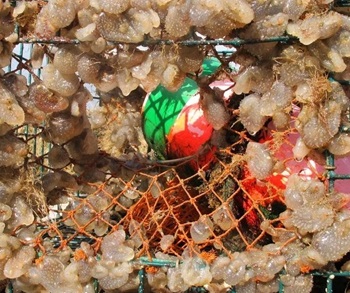 The small invertebrates, several species of which are invasive, are attaching themselves in large numbers to lobster traps and aquaculture equipment, at times creating a major hassle for harvesters as they try to tend to their gear. “The month of September, they come on like gangbusters,” Hilton Turner, a lobsterman and chair of Stonington’s harbor committee, said about the tunicates, which are better known as sea squirts. “Every year gets a little worse,” he said. Lobstermen use different techniques to try to remove the squirts. Some set the traps in boiling hot water tanks on their boats, some try immersing them in salt-saturated water, and still others blast them with a power washer, which can be time-consuming, Turner said. more, >>CLICK TO READ<< 08:25
The small invertebrates, several species of which are invasive, are attaching themselves in large numbers to lobster traps and aquaculture equipment, at times creating a major hassle for harvesters as they try to tend to their gear. “The month of September, they come on like gangbusters,” Hilton Turner, a lobsterman and chair of Stonington’s harbor committee, said about the tunicates, which are better known as sea squirts. “Every year gets a little worse,” he said. Lobstermen use different techniques to try to remove the squirts. Some set the traps in boiling hot water tanks on their boats, some try immersing them in salt-saturated water, and still others blast them with a power washer, which can be time-consuming, Turner said. more, >>CLICK TO READ<< 08:25
Right whales and offshore wind: reflections on an uneasy coexistence
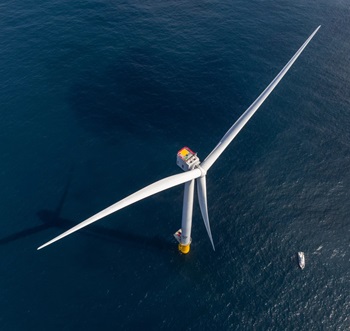 Michael Moore has spent decades studying North Atlantic right whales. He’s seen somewhere around 150 of them. It’s a feat, given that now there are just about 360 left in the world. But the veterinarian, author, and scientist emeritus from the Woods Hole Oceanographic Institution had never seen an offshore wind farm up close — until last week. “Look at them. All out in neat little rows,” he said, standing at the rear of a 53-foot charter boat that offered a closeup view of construction on Vineyard Wind, 15 miles south of Martha’s Vineyard. About half of the planned 62 turbines are fully constructed, reaching more than 250 meters into the sky. When the boat slowed down to pass beneath one of the turbines, Moore was awestruck by the length of a blade. “Right whales are 40 to 50 feet,” he said. “So, you can stretch seven right whales along the length of one of these blades.” Photos, more, >>CLICK TO READ<< 16:48
Michael Moore has spent decades studying North Atlantic right whales. He’s seen somewhere around 150 of them. It’s a feat, given that now there are just about 360 left in the world. But the veterinarian, author, and scientist emeritus from the Woods Hole Oceanographic Institution had never seen an offshore wind farm up close — until last week. “Look at them. All out in neat little rows,” he said, standing at the rear of a 53-foot charter boat that offered a closeup view of construction on Vineyard Wind, 15 miles south of Martha’s Vineyard. About half of the planned 62 turbines are fully constructed, reaching more than 250 meters into the sky. When the boat slowed down to pass beneath one of the turbines, Moore was awestruck by the length of a blade. “Right whales are 40 to 50 feet,” he said. “So, you can stretch seven right whales along the length of one of these blades.” Photos, more, >>CLICK TO READ<< 16:48
Gulf of Maine lobsters are experiencing a housing crisis
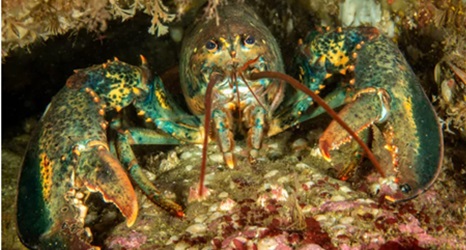 Lobster fishing has been a good business in the Gulf of Maine for a long time. With the exception of a few notable dips, both the landings and value of the catch have been on an upward swing for decades. Between 1984 and 2014, the lobster population in the Gulf of Maine jumped an estimated 515 percent, while simultaneously declining by 78 percent in southern New England as the water warmed in both regions. While it’s started to decline in recent years, numbers are still far higher than they were several decades ago. The result? A lobster housing crisis. “The warming sea temperatures have actually created a real sweet spot for lobster reproduction,” said Brian Skerry, a National Geographic photographer and producer on the recent GBH/PBS series Sea Change, which explores the impact of climate change on the Gulf of Maine. more, >>CLICK TO READ<< 17:51
Lobster fishing has been a good business in the Gulf of Maine for a long time. With the exception of a few notable dips, both the landings and value of the catch have been on an upward swing for decades. Between 1984 and 2014, the lobster population in the Gulf of Maine jumped an estimated 515 percent, while simultaneously declining by 78 percent in southern New England as the water warmed in both regions. While it’s started to decline in recent years, numbers are still far higher than they were several decades ago. The result? A lobster housing crisis. “The warming sea temperatures have actually created a real sweet spot for lobster reproduction,” said Brian Skerry, a National Geographic photographer and producer on the recent GBH/PBS series Sea Change, which explores the impact of climate change on the Gulf of Maine. more, >>CLICK TO READ<< 17:51
N.S. spends $6.5M on fund to reduce emissions from boats, commercial fisheries
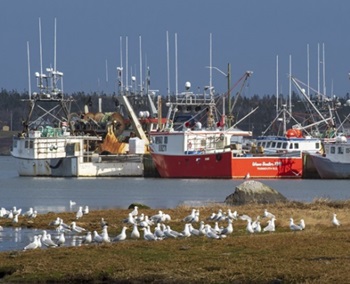 Nova Scotia is seeking to cut down on greenhouse gas emissions from the seafood sector with a greenhouse gas emissions. According to a news release from the province, the Fisheries and Aquaculture Energy Efficiency Innovation Fund will support initiatives to reduce emissions from boats, buildings, aquaculture operations and commercial fisheries. “Our industries are already leaders in fighting climate change through the investments they’re making to reduce energy use,” said Kent Smith, minister of fisheries and aquaculture, in the release. more, >>CLICK TO READ<< 07:18
Nova Scotia is seeking to cut down on greenhouse gas emissions from the seafood sector with a greenhouse gas emissions. According to a news release from the province, the Fisheries and Aquaculture Energy Efficiency Innovation Fund will support initiatives to reduce emissions from boats, buildings, aquaculture operations and commercial fisheries. “Our industries are already leaders in fighting climate change through the investments they’re making to reduce energy use,” said Kent Smith, minister of fisheries and aquaculture, in the release. more, >>CLICK TO READ<< 07:18
Atlantic herring suffering in warming Gulf of St. Lawrence
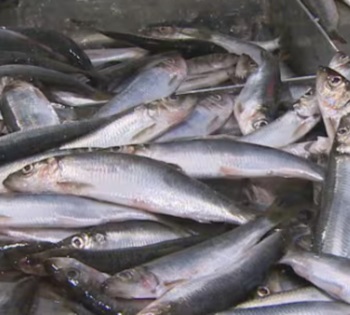 Decades of research show a slow decline in herring stocks in the Gulf of St. Lawrence, and scientists are linking that decline to waters that are warming with climate change. Recent research from NASA found that about 90 per cent of global warming is occurring in the ocean. In the Gulf of St. Lawrence, Joël Chassé, an oceanographer with Fisheries and Oceans Canada, said 11 of 12 months last year had warmer than normal surface temperatures, and he expects a similar pattern this year. “Fishermen in northern New Brunswick, the Baie des Chaleur region, were having difficulty finding the fish,” said Jacob Burbank, a researcher in fish ecology with Fisheries and Oceans Canada. “They weren’t seeing Atlantic herring where they normally would see Atlantic herring. They kept waiting for them to come in for their spawning and they just didn’t see them.” more, >>CLICK TO READ<< 11:40
Decades of research show a slow decline in herring stocks in the Gulf of St. Lawrence, and scientists are linking that decline to waters that are warming with climate change. Recent research from NASA found that about 90 per cent of global warming is occurring in the ocean. In the Gulf of St. Lawrence, Joël Chassé, an oceanographer with Fisheries and Oceans Canada, said 11 of 12 months last year had warmer than normal surface temperatures, and he expects a similar pattern this year. “Fishermen in northern New Brunswick, the Baie des Chaleur region, were having difficulty finding the fish,” said Jacob Burbank, a researcher in fish ecology with Fisheries and Oceans Canada. “They weren’t seeing Atlantic herring where they normally would see Atlantic herring. They kept waiting for them to come in for their spawning and they just didn’t see them.” more, >>CLICK TO READ<< 11:40
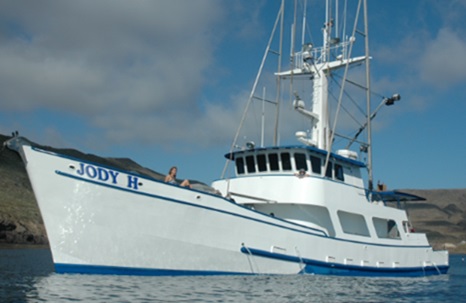
Climate change forces 3rd gen fisherman to rethink this year
Every June, fisherman Scott Hawkins and his small crew set sail from a marina in San Diego and travel hundreds of miles, scouring the water, hoping for a good catch of albacore tuna. It can take hours or days to stumble upon a school of them. But when they do, everyone springs into action at once. The men grab fishing poles taller than they are, stand in a row on the edge of the boat and cast their lines into the water. Every few seconds, one of them pulls up a fat, two-foot-long albacore tuna and hoists it over his shoulder onto the pile. Every thud is another one landing atop the dozens already flapping on deck. They do this 17 hour per day for five months. “It’s the exact same that my grandfather did in the 50s,” Hawkins says. But this June, the boat isn’t leaving the marina. more, >>CLICK TO READ<< 15:16
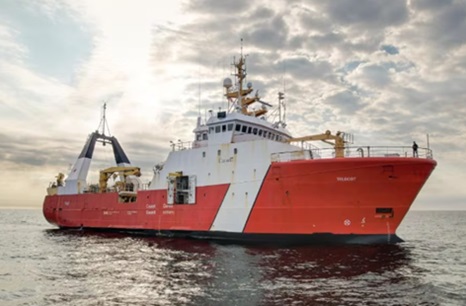
Waters off Scotian Shelf are cooling while scientists wonder if decade-long warming trend is over
In recent years, warming temperatures have grabbed headlines, with record highs being set throughout the region. Recently, on the Scotian shelf, it has moved in the other direction. “It is really interesting,” Beazley said in a wharfside interview at the Bedford Institute of Oceanography. “We did see a continuation of the trend that we observed in 2023, which was the temperatures are actually returning to normal or even below normal conditions in some areas. It’s getting cooler.” Since 2012, ocean temperatures off Nova Scotia at depth have been consistently warmer — by about two degrees above normal. more, >>CLICK TO READ<< 09:29
Warming waters in Casco Bay are driving herring farther from shore
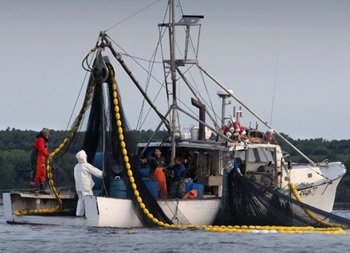 The Gulf of Maine is warming three times faster than the average global ocean, driving some cold-water species like Atlantic herring, the preferred lobster bait — farther away from its shoreline spawning habitat earlier than usual and attracting species from warmer southern waters, including blue crab and black sea bass, a new survey found. The warmth is stressing some of Maine’s keystone fisheries, according to the Gulf of Maine Research Institute’s report on the Casco Bay ecosystem released recently. The report is the first time the institute took a longer, 10-year look at the pace of environmental changes and their effects on ecosystems close to shore. It found that warming waters related to climate change, along with human activities, ocean acidification and harmful algal blooms, are causing different behaviors in species that could hinder their ability to reproduce and thrive. more, >>CLICK TO READ<< 09:52
The Gulf of Maine is warming three times faster than the average global ocean, driving some cold-water species like Atlantic herring, the preferred lobster bait — farther away from its shoreline spawning habitat earlier than usual and attracting species from warmer southern waters, including blue crab and black sea bass, a new survey found. The warmth is stressing some of Maine’s keystone fisheries, according to the Gulf of Maine Research Institute’s report on the Casco Bay ecosystem released recently. The report is the first time the institute took a longer, 10-year look at the pace of environmental changes and their effects on ecosystems close to shore. It found that warming waters related to climate change, along with human activities, ocean acidification and harmful algal blooms, are causing different behaviors in species that could hinder their ability to reproduce and thrive. more, >>CLICK TO READ<< 09:52
The meaning behind Ed Parker’s painting, The Lobster Trap – Thief of Tradition
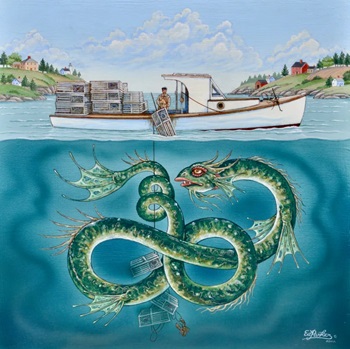 In the painting The Lobster Trap by Ed Parker, a Maine lobsterman lowers crates into the water while, unbeknownst to him, a large sea monster intertwines itself with the line. The calm water and blue skies suggest a peaceful and idyllic day, juxtaposed with the strange creature just below the surface. “[The painting] is an image of the state of Maine,” said Parker in a telephone interview. “The culture is in as much jeopardy, I think, as the fishery itself. They’re so interlinked and younger people don’t see a lot of future in it.” more, >>click to read<< 11:19
In the painting The Lobster Trap by Ed Parker, a Maine lobsterman lowers crates into the water while, unbeknownst to him, a large sea monster intertwines itself with the line. The calm water and blue skies suggest a peaceful and idyllic day, juxtaposed with the strange creature just below the surface. “[The painting] is an image of the state of Maine,” said Parker in a telephone interview. “The culture is in as much jeopardy, I think, as the fishery itself. They’re so interlinked and younger people don’t see a lot of future in it.” more, >>click to read<< 11:19
Putting the Cart Before the Redfish
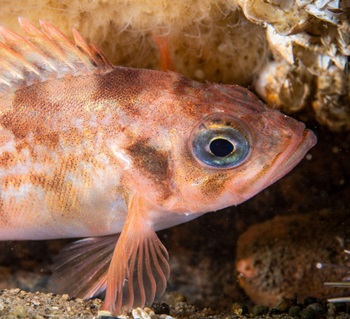 This was supposed to be a good-news story. In Atlantic Canada’s Gulf of St. Lawrence, redfish have returned from the brink. Nearly 30 years after the fishery was closed, redfish populations have rebounded. Fishers, who have suffered through years of fisheries closures and widespread stock declines, have been eagerly eyeing the reemergence of the resource. But in early 2024, when Canadian fisheries minister Diane Lebouthillier declared that the redfish fishery would reopen later this year, keen observers received the announcement with apprehension. And now, as the reopening draws near—the tentative start date is June 15—conservationists and fishers say that climate change, shifts in the Gulf of St. Lawrence ecosystem, and unfavorable market conditions mean the fishery is unlikely to be the boon many are anticipating. This change of perspective hinges, in part, on research by scientists with Fisheries and Oceans Canada (DFO) that shows redfish have stopped growing. more, >>click to read<< 12:38
This was supposed to be a good-news story. In Atlantic Canada’s Gulf of St. Lawrence, redfish have returned from the brink. Nearly 30 years after the fishery was closed, redfish populations have rebounded. Fishers, who have suffered through years of fisheries closures and widespread stock declines, have been eagerly eyeing the reemergence of the resource. But in early 2024, when Canadian fisheries minister Diane Lebouthillier declared that the redfish fishery would reopen later this year, keen observers received the announcement with apprehension. And now, as the reopening draws near—the tentative start date is June 15—conservationists and fishers say that climate change, shifts in the Gulf of St. Lawrence ecosystem, and unfavorable market conditions mean the fishery is unlikely to be the boon many are anticipating. This change of perspective hinges, in part, on research by scientists with Fisheries and Oceans Canada (DFO) that shows redfish have stopped growing. more, >>click to read<< 12:38
Whale not seen in 200 years spotted in New England waters, scientists say
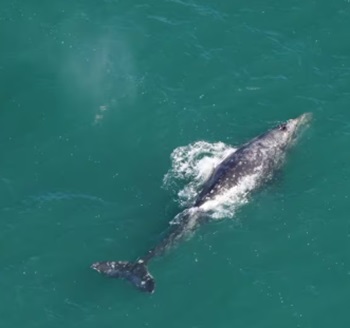 A gray whale that hasn’t been seen in 200 years has been spotted off the coast of Massachusetts, according to officials with the New England Aquarium. Aquarium scientists said the whale was seen on March 1 while they were flying over the ocean 30 miles south of Nantucket. Orla O’Brien is the associate research scientist in the Anderson Cabot Center for Ocean Life at the New England Aquarium. She said seeing the whale was completely unexpected. “I didn’t want to say out loud what it was, because it seemed crazy,” she said. more, >>click to read<< 13:10
A gray whale that hasn’t been seen in 200 years has been spotted off the coast of Massachusetts, according to officials with the New England Aquarium. Aquarium scientists said the whale was seen on March 1 while they were flying over the ocean 30 miles south of Nantucket. Orla O’Brien is the associate research scientist in the Anderson Cabot Center for Ocean Life at the New England Aquarium. She said seeing the whale was completely unexpected. “I didn’t want to say out loud what it was, because it seemed crazy,” she said. more, >>click to read<< 13:10
Scotian Shelf shrimp fishery braces for another cut
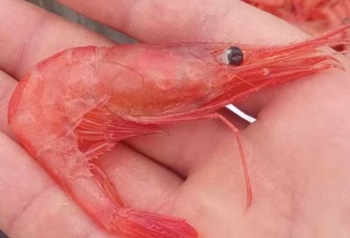 For a third straight year, the shrimp fishery off eastern Nova Scotia is facing a big quota cut with ocean conditions to blame. The recent scientific assessment for northern shrimp on the eastern Scotian Shelf showed environmental factors — including warmer ocean water due to climate change — are contributing to the poor condition of the stock, he says. And the response, he predicts, will be a reduction in the total allowable catch. The Department of Fisheries and Oceans (DFO) is expected to announce the 2024 shrimp quota in several weeks. more, >>click to read<< 10:59
For a third straight year, the shrimp fishery off eastern Nova Scotia is facing a big quota cut with ocean conditions to blame. The recent scientific assessment for northern shrimp on the eastern Scotian Shelf showed environmental factors — including warmer ocean water due to climate change — are contributing to the poor condition of the stock, he says. And the response, he predicts, will be a reduction in the total allowable catch. The Department of Fisheries and Oceans (DFO) is expected to announce the 2024 shrimp quota in several weeks. more, >>click to read<< 10:59
Help Alaska’s fisheries: Reduce methane emissions
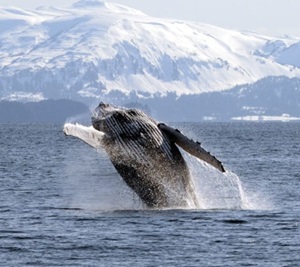 NOAA now confirms that another critical Alaska fishery is in decline due to successive marine heat waves. First there was the loss of 10 billion snow crabs and the close of the once-lucrative Bering Sea crab fisheries; now we know that climate change (warming seas) is the culprit behind the crash of chum salmon on the Yukon-Kuskokwim. Both these fisheries are the life blood to many Alaskan communities and villages. From the Yukon to Kodiak, from the Arctic to Ketchikan, Alaska’s coastal fisheries must now confront the dual threat of heat waves and ocean acidification. more, >>click to read<< By Linda Behnken and Kate Troll 15:48
NOAA now confirms that another critical Alaska fishery is in decline due to successive marine heat waves. First there was the loss of 10 billion snow crabs and the close of the once-lucrative Bering Sea crab fisheries; now we know that climate change (warming seas) is the culprit behind the crash of chum salmon on the Yukon-Kuskokwim. Both these fisheries are the life blood to many Alaskan communities and villages. From the Yukon to Kodiak, from the Arctic to Ketchikan, Alaska’s coastal fisheries must now confront the dual threat of heat waves and ocean acidification. more, >>click to read<< By Linda Behnken and Kate Troll 15:48
P.E.I. Fishermen’s Association calls for more timely, better monitoring in wake of federal report
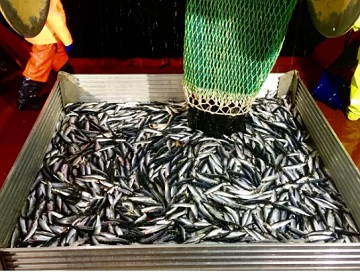 Executive director Ian MacPherson said a recent report from the federal environment commissioner underlined the importance of doing more, and better science, especially as the crucial herring and mackerel fisheries remain closed to Island fishers. “Herring and mackerel are the big ones here on Prince Edward Island, important fisheries to us, and we’d like to get them reopened — and we realize these are science-based decisions, but you need accurate and timely information,” MacPherson said. >>click to read<< 06:38
Executive director Ian MacPherson said a recent report from the federal environment commissioner underlined the importance of doing more, and better science, especially as the crucial herring and mackerel fisheries remain closed to Island fishers. “Herring and mackerel are the big ones here on Prince Edward Island, important fisheries to us, and we’d like to get them reopened — and we realize these are science-based decisions, but you need accurate and timely information,” MacPherson said. >>click to read<< 06:38
As climate change and high costs plague Alaska’s fisheries, fewer young people take up the trade
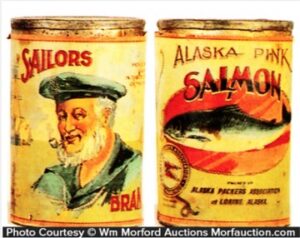
Know-nothing journalism
Credibility dies in a field of little mistakes. This is why it is painful to read what passes for news today: “Pink salmon get their nickname from their propensity to bite on anything pink.” Or so reported Gregory Scruggs of The Seattle Times after visiting West Seattle’s Lincoln Park on Aug. 22 for a story on Life/Outdoors in the Emerald City. Yes, and red salmon got their nickname for their propensity to bite on anything red and silvers on silver. And don’t forget those dog salmon. Note to the unwary: Leave Fido at home if you decide to pursue the latter. They have a propensity to bite on dogs. This is the reason there are so many three-legged dogs in villages along the Yukon River. All of this would be funny if, of course, it was funny. >>click to read<< 10:18
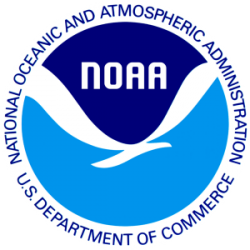
NOAA outlines sweeping plan to boost the nation’s seafood industry
The National Oceanic and Atmospheric Administration has released a sweeping five-year plan to prioritize and promote the country’s commercial fishing industry. NOAA Fisheries announced its National Seafood Strategy on Wednesday. The agency said in a press release that the plan will “outline the direction” of the country’s seafood sector. It’s the first time NOAA has released an overall strategy aimed at addressing industry needs – the agency says it will complement other federal policies that are already in place. >click to read< 11:29
Cape Breton boatbuilders help DFO to face commercial, climate change challenges
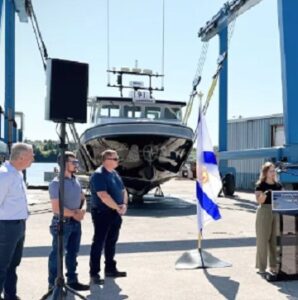 The federal Department of Fisheries and Oceans is having four new patrol boats built in rural Cape Breton to address some of the challenges faced by fisheries enforcement officers. The new boats are larger than the existing ones to better deal with the effects of climate change, larger commercial vessels and heavier fishing gear. Once completed, the boats will be used in the Atlantic region. “As we’ve seen in the last couple of years, climate change is a huge thing … and adverse weather conditions are getting more and more frequent and our officers just don’t take a day off because it’s really bad weather-wise,” said Scott Phillips, DFO’s eastern Nova Scotia area chief of conservation and protection. Photos, >click to read< 17:27
The federal Department of Fisheries and Oceans is having four new patrol boats built in rural Cape Breton to address some of the challenges faced by fisheries enforcement officers. The new boats are larger than the existing ones to better deal with the effects of climate change, larger commercial vessels and heavier fishing gear. Once completed, the boats will be used in the Atlantic region. “As we’ve seen in the last couple of years, climate change is a huge thing … and adverse weather conditions are getting more and more frequent and our officers just don’t take a day off because it’s really bad weather-wise,” said Scott Phillips, DFO’s eastern Nova Scotia area chief of conservation and protection. Photos, >click to read< 17:27
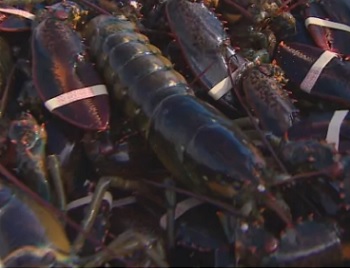
Stock assessments show Maritime lobster population strong, fishery sustainable
Adam Cook is a DFO biologist who tracks lobster populations along the Scotian Shelf and Bay of Fundy, waters that support nearly 3,000 commercial licence holders in 12 lobster fishing areas (LFAs). Cook and his colleagues recently posted stock assessments for 2022. He said all LFAs in the Maritimes are in a healthy zone for stock status. “Which suggests there’s still enough lobster to not raise any sort of conservation concerns. The commercial biomass is doing quite well,” Cook said. It’s the same story in the southern Gulf of St. Lawrence, although DFO’s stock assessments for five fishings area in that region have not been posted. >click to read< 10:17
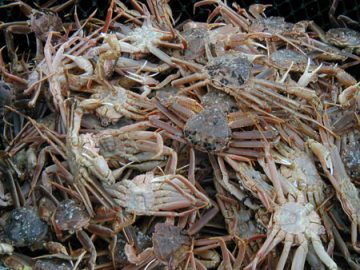
Disaster aid has arrived, but Western Alaska’s salmon and crab problems continue
The Alaska congressional delegation announced on Friday that the U.S. Commerce Department released the disaster aid. The money is to go to harvesters, processors and communities affected by designated disasters in salmon and crab fisheries that occurred between 2020 and 2022. For Bering Sea snow crab, signs are that the problems that led to the first-ever harvest closure, which was announced last October, will last for years. The National Oceanic and Atmospheric Administration Fisheries Service 2022 survey found that despite the emergence of cooler and more normal temperatures, mature male snow crab abundance was the lowest on record and mature female snow crab abundance was the third lowest on record. >click to read< 10:12
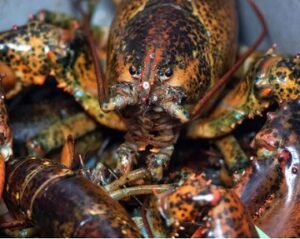
How warming waters around P.E.I. could affect snow crab and lobster
Research scientist Joël Chassé says as the atmosphere warms, the ocean waters around P.E.I. are also heating up. “Changes are happening. It’s not deniable anymore. And if the these changes don’t slow down, we will have to adapt to these changes.” Chassé said there are implications for some fish species, some positive and some negative. Fisheries and Oceans biologist Tobie Surette said that while lobster is a warm water coastal species, snow crab prefer deeper, colder waters. “Lobster has largely benefited from the warming climates, at least so far,” he said. Surette said they don’t know exactly why that is. (Snow Crab) And for now, they are doing well: “We’re at the third-highest biomass in the history of the survey right now.” But Surette knows that could change. He has been in contact with snow crab scientists from Alaska. Photos, >click to read< 18:51

Celebrate Whale Week with NOAA Fisheries: A message from Janet Coit, Assistant Administrator
At NOAA Fisheries, our team of dedicated scientists and managers is responsible for the health and sustainability of more than 30 whale species in U.S and territorial waters. Every year, we spend a week taking a deeper dive to share our whale expertise. This year is particularly notable because it is the 50th anniversary of the Endangered Species Act. Some of the most recognizable whales—North Atlantic right whales, Southern Resident killer whales, and Cook Inlet belugas—are at the top of our Species in the Spotlight initiative. >click to read< 18:33
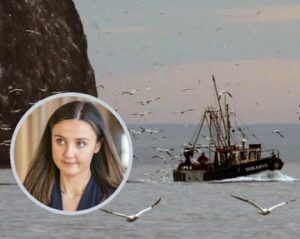
SNP minister says fishing ban ‘will not be imposed’ on communities
Scotland’s Net Zero Secretary has defended her government’s controversial plans to expand protected marine areas – insisting that no sites have been identified and proposals will not be “imposed” on coastal communities. Fishing bosses have reacted angrily to plans by the Scottish Government to consider introducing highly protected marine areas (HMPAs). Under the plans, designated areas would be under rules to “strictly protect and leave undisturbed, all natural processes of the marine ecosystem”, including “the seabed, water column habitats and everything that lives in the protected area”. >click to read< 09:12
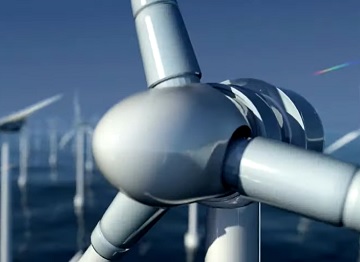
Offshore Wind: No measurable influence on climate change
Officially, offshore wind developers anticipate their projects will “have no measurable influence on climate change.” Knowing this, they offer a different rationale. In the “purpose and need” section of the draft environmental impact statement for Revolution Wind, Ørsted justifies the offshore wind project based on its ability to fulfill Rhode Island’s mandate for “renewable” energy. Meeting a political mandate differs rather significantly from combating climate change. Ørsted seems to understand this difference, but the public may not. No environmentally conscious individual wants to hear such depressing facts, including us. Despite numerous articles from pro-wind enthusiasts touting the promise of offshore wind, the carbon savings of these projects fail to justify their construction. >click to read this< 18:34






